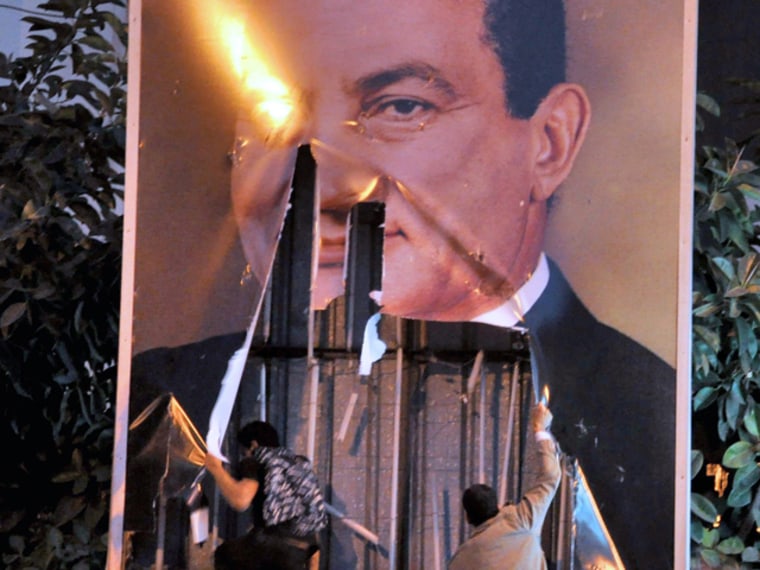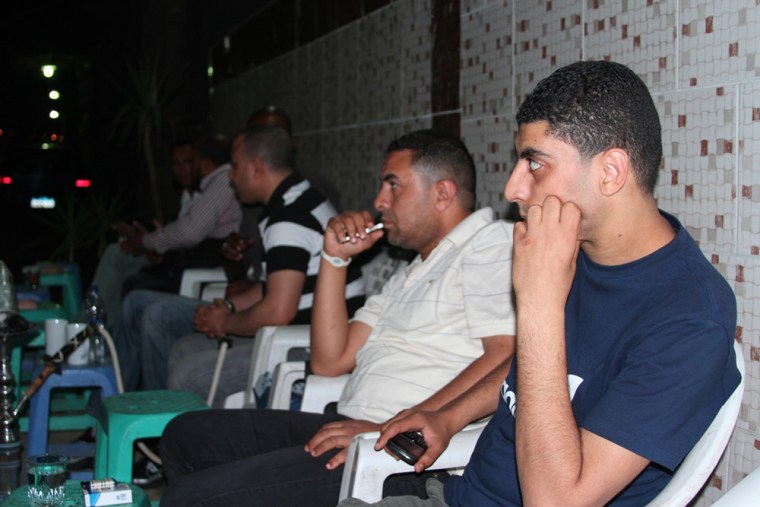CAIRO -- People died to make Egypt’s first-ever presidential debate happen on Thursday, and Said Ibrahim kept the victims of the country's revolution in mind as he watched them on TV.
“We are very happy to watch this, but it was the young people of the revolution who made it happen. People paid with their lives to make this possible," the 44-year-old chef said. "In the end, I hope whoever wins will be the best.”
Reveling in their first chance to hear their presidential candidates go head to head, viewers gathered in living rooms and cafes across Egypt to watch the debate between the two presidential frontrunners. Amr Moussa, former head of the Arab League and former foreign minister, faced off against Abdul Moneim Abol Fotoh, a moderate Islamist and former Muslim Brotherhood member.
They fielded tough questions from two anchors in a tightly structured debate seen on three private satellite stations. The candidates also had the chance to challenge each other with pointed questions about Islamic religious law, links to the old regime and fiscal policy. The spectacle of politicians being questioned in public was riveting. “It’s the birth of democracy in Egypt,” smiled Arafa Abu Al Fadel, a 36-year-old production manager at Egyptian state TV. “We have seen this in France or Europe. It gives us a chance to see the candidates, it gives us a chance to choose … I am now confused, but that is a good thing!”

Al Fadel's friend Ahmed Rifai, a 29-year-old production manager, was equally enthusiastic. “This is a new way. It’s an American type of debate. From the time of the pharaohs, we have had leaders imposed on us. Now we get to choose between many candidates. It is the first time we experience democracy. Even if we don’t make the best choice and are confused, it is the first step toward democracy.”
Poll: Most Egyptians think US aid billions have 'negative effect'
Who won the debate? According to a very small straw poll in a sidewalk café a stone’s throw from iconic Tahrir Square, Amr Moussa was the hand’s down favorite.
“I like Amr Moussa,” said hairdresser Abdel Hamid Mohamed, age 52. “He appealed to me because of the way he spoke and answered. He is experienced and older and has more knowledge of foreign affairs.”
Watch World News videos on msnbc.com
Ahmed Rifai agreed. “Amr Moussa has more political experience and background. His way of speaking is more diplomatic.”
Arafa Al Fadel was more circumspect. “I was leaning toward Amr Moussa because of his previous experience. I never had a chance to see Abol Fotoh before. Maybe he will fulfill his promises.”
Although Said Ibrahim was impressed by both contenders’ debate styles, he continued to lean toward Amr Moussa. “Because he has political experience, I think his four years will be good and that he will be just. Yes, he participated in the old regime, but we know what his opinions were during that old regime.”
More world news from msnbc.com and NBC News:
- Bad neighbors for Team USA? Occupy camp axed
- WWII fighter plane found preserved in Sahara Desert
- Egypt's first TV presidential debate thrills viewers
- 88,000-mile voyage? Plastic card found after 33 years
- Hell-raising holy men: Boozy monks caught gambling
- Sources: Spy who uncovered underwear bomb plot is a Brit
- Video: Murder and corruption scandal rocks China
- Move over, Al Roker! Prince Charles becomes weatherman
Follow us on Twitter: @msnbc_world
